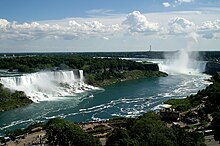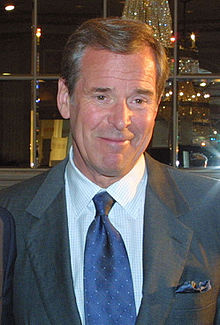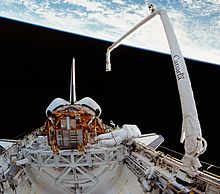Portal:Canada
| Showcase | Content | Contributing |
Introduction
Canada is a country in North America. Its ten provinces and three territories extend from the Atlantic Ocean to the Pacific Ocean and northward into the Arctic Ocean, making it the world's second-largest country by total area, with the world's longest coastline. Its border with the United States is the world's longest international land border. The country is characterized by a wide range of both meteorologic and geological regions. It is a sparsely inhabited country of 40 million people, the vast majority residing south of the 55th parallel in urban areas. Canada's capital is Ottawa and its three largest metropolitan areas are Toronto, Montreal, and Vancouver.
Canada is a parliamentary democracy and a constitutional monarchy in the Westminster tradition. The country's head of government is the prime minister, who holds office by virtue of their ability to command the confidence of the elected House of Commons and is "called upon" by the governor general, representing the monarch of Canada, the ceremonial head of state. The country is a Commonwealth realm and is officially bilingual (English and French) in the federal jurisdiction. It is very highly ranked in international measurements of government transparency, quality of life, economic competitiveness, innovation, education and gender equality. It is one of the world's most ethnically diverse and multicultural nations, the product of large-scale immigration. Canada's long and complex relationship with the United States has had a significant impact on its history, economy, and culture.
A developed country, Canada has a high nominal per capita income globally and its advanced economy ranks among the largest in the world, relying chiefly upon its abundant natural resources and well-developed international trade networks. It is recognized as a middle power for its role in international affairs, with a tendency to pursue multilateral and international solutions. Canada's peacekeeping role during the 20th century has had a significant influence on its global image. Canada is part of multiple international organizations and forums. (Full article...)
Featured article -
Niagara Falls (/naɪˈæɡərə/) is a group of three waterfalls at the southern end of Niagara Gorge, spanning the border between the province of Ontario in Canada and the state of New York in the United States. The largest of the three is Horseshoe Falls, which straddles the international border of the two countries. It is also known as the Canadian Falls. The smaller American Falls and Bridal Veil Falls lie within the United States. Bridal Veil Falls is separated from Horseshoe Falls by Goat Island and from American Falls by Luna Island, with both islands situated in New York. (Full article...)
Featured biography -
Peter Charles Archibald Ewart Jennings CM (July 29, 1938 – August 7, 2005) was a Canadian-American television journalist, best known for serving as the sole anchor of ABC World News Tonight from 1983 until his death from lung cancer in 2005. Despite dropping out of high school, Jennings transformed himself into one of American television's most prominent journalists. (Full article...)
Selected panorama -
National symbol -
Canadarm or Canadarm1 (officially Shuttle Remote Manipulator System or SRMS, also SSRMS) is a series of robotic arms that were used on the Space Shuttle orbiters to deploy, manoeuvre, and capture payloads. After the Space Shuttle Columbia disaster, the Canadarm was always paired with the Orbiter Boom Sensor System (OBSS), which was used to inspect the exterior of the shuttle for damage to the thermal protection system. (Full article...)
Selected vital article -
Canadian cuisine consists of the cooking traditions and practices of Canada, with regional variances around the country. First Nations and Inuit have practiced their culinary traditions in what is now Canada since at least 15,000 years ago. The advent of European explorers and settlers, first on the east coast and then throughout the wider territories of New France, British North America and Canada, saw the melding of foreign recipes, cooking techniques, and ingredients with indigenous flora and fauna. Modern Canadian cuisine has maintained this dedication to local ingredients and terroir, as exemplified in the naming of specific ingredients based on their locale, such as Malpeque oysters or Alberta beef. Accordingly, Canadian cuisine privileges the quality of ingredients and regionality, and may be broadly defined as a national tradition of "creole" culinary practices, based on the complex multicultural and geographically diverse nature of both historical and contemporary Canadian society. (Full article...)
Selected picture -
Current events
- April 12, 2024 – War in Sudan
- Canada pledges $132.2 million dollars to Sudan to help people affected by the country's ongoing humanitarian crisis. (Global News)
- April 1, 2024 – Israel–Hamas war
- Seven volunteers from the World Central Kitchen, including six British, Polish, Australian and Palestinian nationals and a dual American-Canadian citizen, are killed in an Israeli airstrike south of Deir el-Balah. (Al Jazeera)
- March 31, 2024 – Haitian crisis
- Canada deploys 70 members of its armed forces to Jamaica to train peacekeepers for a future intervention in Haiti. (CBC News)
- March 9, 2024 – Israel–Hamas war
- Canada and Sweden resume funding for UNRWA, which had been suspended following the UNRWA October 7 controversy. (BBC News)
- March 6, 2024 – Killing of the Wickramasinghe family
- A Sri Lankan family, of four children and their mother, are killed with the father injured in a mass stabbing at a residence in the suburb of Barrhaven, in Ottawa, Canada. A young man is arrested. (CBOT-DT)
- February 28, 2024 –
- The Canadian government releases its report into the high-profile firings of two scientists from the National Microbiology Laboratory in Winnipeg, Manitoba, in 2021, stating that the pair worked closely and covertly with the Chinese government. (National Post)
Did you know -

- ... that the many refugees who have entered Canada via Roxham Road at the border between New York and Quebec since 2017 may not have been breaking any laws?
- ... that Canadian football player Nicholas Dheilly tied his team's single-game sack record in his debut?
- ... that the Canadian Coalition for Firearm Rights has been described as "Canada's most prominent pro-gun group"?
- ... that Canadian photographer and architectural activist Brian Merrett's works prompted the preservation of Montreal's Shaughnessy House, now the Canadian Centre for Architecture?
- ... that Canadian professional ice hockey player Larry Jeffrey had eleven knee surgeries in a span of nine years?
- ... that Chickaboom!, by country musician Tami Neilson, was nominated for both Canadian and New Zealand music awards?
- ... that Laura Robinson invented Canada's best-selling board game before becoming a successful actress and television producer?
Featured list -
The 400-series highways are a network of controlled-access highways in the Canadian province of Ontario, forming a special subset of the provincial highway system. They are analogous to the Interstate Highway System in the United States or the Autoroute system of neighbouring Quebec, and are regulated by the Ministry of Transportation of Ontario (MTO). The 400-series designations were introduced in 1952, although Ontario had been constructing divided highways for two decades prior. Initially, only Highways 400, 401 and 402 were numbered; other designations followed in the subsequent decades. The network is situated almost entirely in Southern Ontario, although Highway 400 extends into the more remote northern portion of the province. (Full article...)
Main articles
Associated Wikimedia
The following Wikimedia Foundation sister projects provide more on this subject:
-
Commons
Free media repository -
Wikibooks
Free textbooks and manuals -
Wikidata
Free knowledge base -
Wikinews
Free-content news -
Wikiquote
Collection of quotations -
Wikisource
Free-content library -
Wikiversity
Free learning tools -
Wikivoyage
Free travel guide -
Wiktionary
Dictionary and thesaurus
































